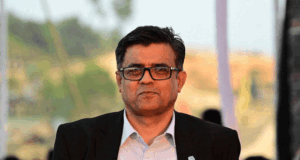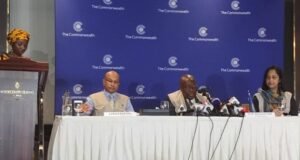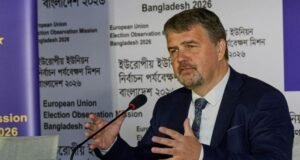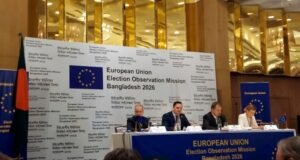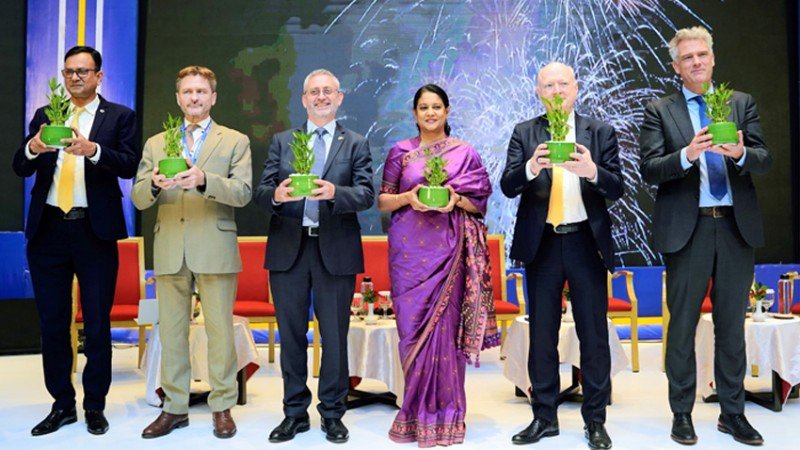
The European Union (EU) and its partners have launched the broadened Team Europe Initiative on Climate and Energy in Bangladesh, pledging over €3.7 billion (around Tk 525 billion) to support the country’s transition toward sustainable energy and climate resilience.
Announcing the initiative at a high-level event in Dhaka on October 9, EU Ambassador Michael Miller called on Bangladesh to mainstream decarbonisation and climate resilience in public policies, underscoring the vital role of private sector investment in complementing public financing.
Ambassador Miller set out that the European Union, EU Member States, European financing institutions, Norway and Switzerland, working as Team Europe and hand in hand with Bangladesh, contribute more than EUR 3.7 billion (or around 525 billion taka), addressing the energy sector modernisation (energy efficiency, renewable energy and grid updating), climate mitigation and also climate adaptation (climate resilient livelihoods and water management, including clean drinking water).
The Ambassador confirmed that the European Union is unwavering in its support of the Paris Agreement.
Through the European Green Deal, driving transition to a net-zero economy by 2050, the EU has turned away from fossil fuels, embracing decarbonisation and clean technology, decoupling economic growth from emissions growth.
The Green Deal is the EU’s growth strategy, and the European Union is committed to delivering on its objectives.
The EU Ambassador recognised the key role of private sector investment in complementing public financing.
“To mobilise investments, we will need to see continued efforts undertaken – building on the work of the interim government – to restore good governance. And we will need to see the creation of a level playing field and greater transparency in procurement and investment decisions, such that EU economic operators may compete on the basis of commercial merit,” added Michael Miller.
He also referred to this week’s launch of the EU Global Gateway hub, which will globally support private sector investment projects.
Stressing the importance of a swift launch of the EU’s Global Green Bond Initiative in Bangladesh, Miller stated: “Green bonds are one of the best ways to raise private funds for sustainable and climate-related investments. They draw in foreign and domestic investors, diversify issuers’ funding sources, and include clear commitments to the SDGs and the Paris Agreement”.
Ms. Syeda Rizwana Hasan, Adviser to Ministry of Environment, Forest and Climate Change and Ministry of Water Resources said: “climate change is a harsh reality for Bangladesh. Adaptation has long been part of our lives, but the growing scale and intensity of climate impacts have pushed our people beyond their limits.”
She emphasized that adaptation alone cannot ensure survival if global emission reduction commitments are not met.
“If the 1.5°C target is not maintained, adaptation will not be enough for countries like Bangladesh,” she warned, calling on major emitters to fulfil their obligations under the Paris Agreement.
We need Europe’s partnership through technology transfer and affordable financing, observed Rizwana Hasan, adding: “Europe has always stood by Bangladesh. We believe this spirit will continue under the Team Europe Initiative, ensuring shared responsibility in tackling climate and energy challenges.”
The Team Europe Initiative is co-chaired by the Germany, France, the Netherlands and the EU.
German Ambassador, Dr. Rüdiger Lotz, the Ambassador of the Kingdom of the Netherlands, Mr Joris van Bommel, and the French Ambassador, Mr. Jean-Marc Séré-Charlet addressed the event.
Ms Diana Acconcia, Director for International Affairs and Climate Finance at the European Commission, attended online, setting out the main elements of EU-Bangladesh cooperation in the area of climate and energy and reflecting upon the upcoming climate conference, COP30, in Brazil.
The event focused on connecting European and Bangladeshi companies working on flood management, desalinisation and climate smart agriculture and, on how to crowd-in private sector innovation, funding and interventions.
 Weekly Bangla Mirror | Bangla Mirror, Bangladeshi news in UK, bangla mirror news
Weekly Bangla Mirror | Bangla Mirror, Bangladeshi news in UK, bangla mirror news



